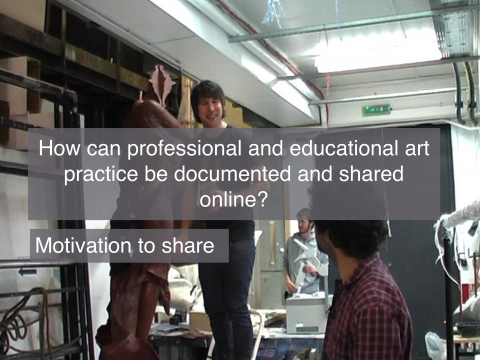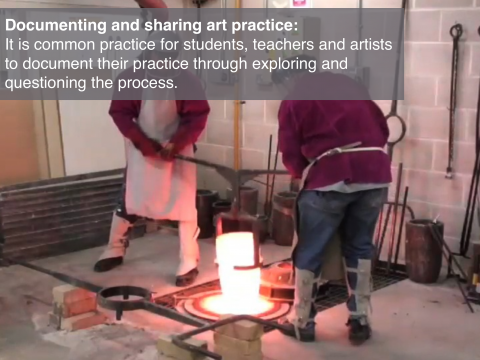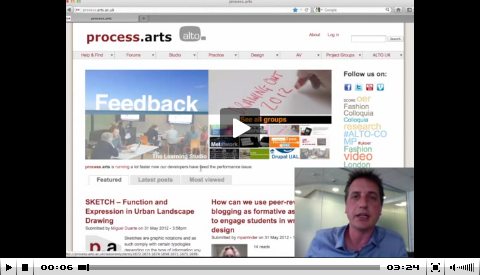About: Process.arts


process.arts.ac.uk, an open online community for sharing art, design and media practice based learning, teaching and research, the site is open to anyone to encourage open communities of practice between individuals, groups, and institutions worldwide.
Log in using your UAL user & password or if your not a member of UAL please create a new account. We are looking into shibboleth for all universities and colleges.
Please contact: elearning-support@arts.ac.uk for all help and support issues.
What is process.arts
process.arts offers a rich media/social media experience for sharing arts practice, users are encouraged to openly share and use creative commons licensed content and support others in doing the same.
See: process.arts overview video created for HEA conference OER stand.
Process.arts, a grass roots web2.0 open educational environment for sharing day-to-day arts practice and research of staff and students, currently provides a new ‘open learning’ space to the University of the Arts London (UAL) that straddles the institution/educational (formal learning) environment and the social (informal learning) environment. It creates an ‘experimental’ space for open educational practitioners to develop and define a new language for open edu-social practice without conforming or being influenced by pre-existing academic structures and processes. The transition of process.arts into an official UAL service will test this model and raise questions as to how institutions successfully support and develop autonomous and independent grassroots innovation without homogenising innovation.
In 2012 UAL began the process of rebuilding its VLE framework, and process.arts was identified as a valuable resource that could fit into the University’s new portfolio of tools; consequently, process.arts is due to be officially introduced as a supported ‘service’ in September 2012.
However, the structure of process.arts does not map onto courses; meta data links user-generated pieces of openly licensed text, image, video and audio content together through individual profiles and subject specific interest groups. Like many web2.0 environments used for education, process.arts can neither really be described as a repository nor as a VLE. Because of this it provides a novel and alternative VLE environment that encourages and supports rich media experimentation and informal learning, a welcome alternative for many to commercial alternatives.
Conversion to a full service will provide a firm foundation for long term stability, integration wth other systems, support and growth. The project team is in the process of integrating the current informal agile development approach into a more formal in-house system. The team are addressing outstanding bugs, monitoring user interface changes and identifying outstanding functionality. There will inevitably be some loss of agile spontaneity although we aim to retain the overall grass roots participatory feel.
Feedback
process.arts has over 700 unique visitors every day, spending an average of 6 minutes on the site at a time, we'd like to find out what process.arts is being used for, in what way is the content useful or has been used or reused? It would be great to get your feedback, your experiences of process.arts, what you'd like to see added, what you like and don't like. Please comments her (no need to login) or contact elearning-support@arts.ac.uk.
Also see prrocess.arts stories http://process.arts.ac.uk/content/open-practice-stories
process.arts context and detailed timeline: see process.arts development history
Contact: elearning-support@arts.ac.uk
| Attachment | Size |
|---|---|
| timeline-main-full.jpg | 827.59 KB |

This text, About: Process.arts, by process.arts is licensed under a Creative Commons Attribution 4.0 International license.
See more about project Groups on process.arts


